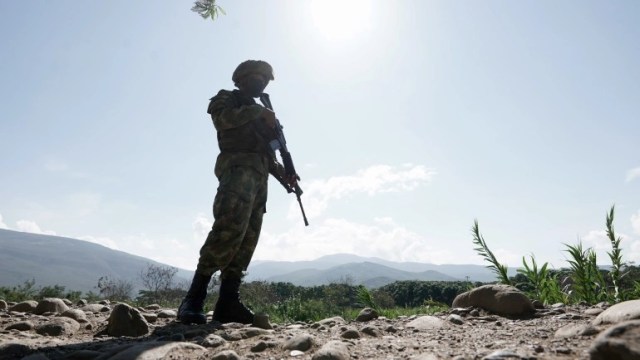
Move risks escalating tensions, analysts say, as two countries gradually reopen shared border after years-long closure.
By Aljazzera – Steven Grattan
Oct 8, 2021
Colombia has sent 14,000 soldiers to its border with Venezuela, which is reopening this week after a three-year closure, in a move rights groups and political analysts say could fuel tensions between the countries.
The Venezuelan government began the process of reopening the border on Tuesday by removing containers placed at the Simón Bolívar International Bridge in 2019.
At the time, Venezuelan President Nicolás Maduro had ordered the closure when a United States-backed humanitarian convoy planned to cross the bridge to deliver aid amid huge shortages of basic food and medical supplies in the country.
However, the 2,200km (1,367-mile) border had already been closed to vehicles since 2015 due to a separate political dispute between the Andean nations, which have been at odds over a surge in Venezuelan migrants crossing into Colombia and the presence of armed groups along the border, among other issues.
The decision to reopen the border comes after years of pressure and negotiations by local residents in those areas, as well as civil society groups and workers’ unions, explained Ronald Rodríguez, head of the Observatory on Venezuela at Bogota’s Rosario University.
Rodríguez told Al Jazeera that while there has always been a large military presence in the border zone, the deployment of thousands of Colombian troops will fuel tensions – and could risk derailing the rapprochement.
“They must be very careful because these types of actions could damage the process,” he said, adding that the diplomatic relationship between the two countries is at its worst.
“We are used to a diplomatic relationship of shouting insults, threats and accusations back and forth, and in the end, the people who live in the border areas who are the most affected by all of this are tired,” Rodriguez said.
Informal crossings
Colombia has been struggling to cope with the influx of Venezuelan refugees and migrants fleeing poverty, violence, and a lack of basic necessities including medicine. More than 5.6 million Venezuelans have left the country in recent years, according to the United Nations, in “one of the largest external displacement crises in the world”.
Venezuela for a long time denied that a humanitarian crisis was unfolding, fuelling tensions with its neighbour. There also have been continual skirmishes on the border, mostly due to the activity of illegal armed groups on either side.
This week, however, Venezuelan Vice President Delcy Rodríguez expressed optimism at the border’s reopening, saying on Monday that the decision was made after “thinking of our people, of the brotherhood and cooperation between the people of Colombia and Venezuela”.
Colombia’s right-wing President Ivan Duque was more measured. “Colombia is willing to begin an orderly process so that we can guarantee this border crossing,” he said, cautioning that the process would not be “disorderly” or “sudden”.
Duque also said he spoke to Venezuelan opposition leader Juan Guaido about the reopening, which the Colombian leader said was pushed by Caracas “above all to allow access for goods and services” without using informal border crossings run by criminal groups.
These crossings, known as “trochas”, for years have been the only way Venezuelans and Colombians could cross the border. A huge percentage of the Venezuelans who have fled their country en masse since 2016 used “trochas” to cross the Simon Bolívar Bridge into the Colombian city of Cucuta. About 1.8 million Venezuelan migrants now reside in Colombia.
Criminal groups
Ariel Avila, a political analyst and deputy director of the Peace and Reconciliation Foundation (Pares), said the reopening will be a big relief for those who had to use the informal crossings. “A lot of the population had to pay criminal groups to be able to pass through,” Avila told Al Jazeera.
…
Read More: Aljazzera – Colombia troop deployment at Venezuela border raises questions
…

